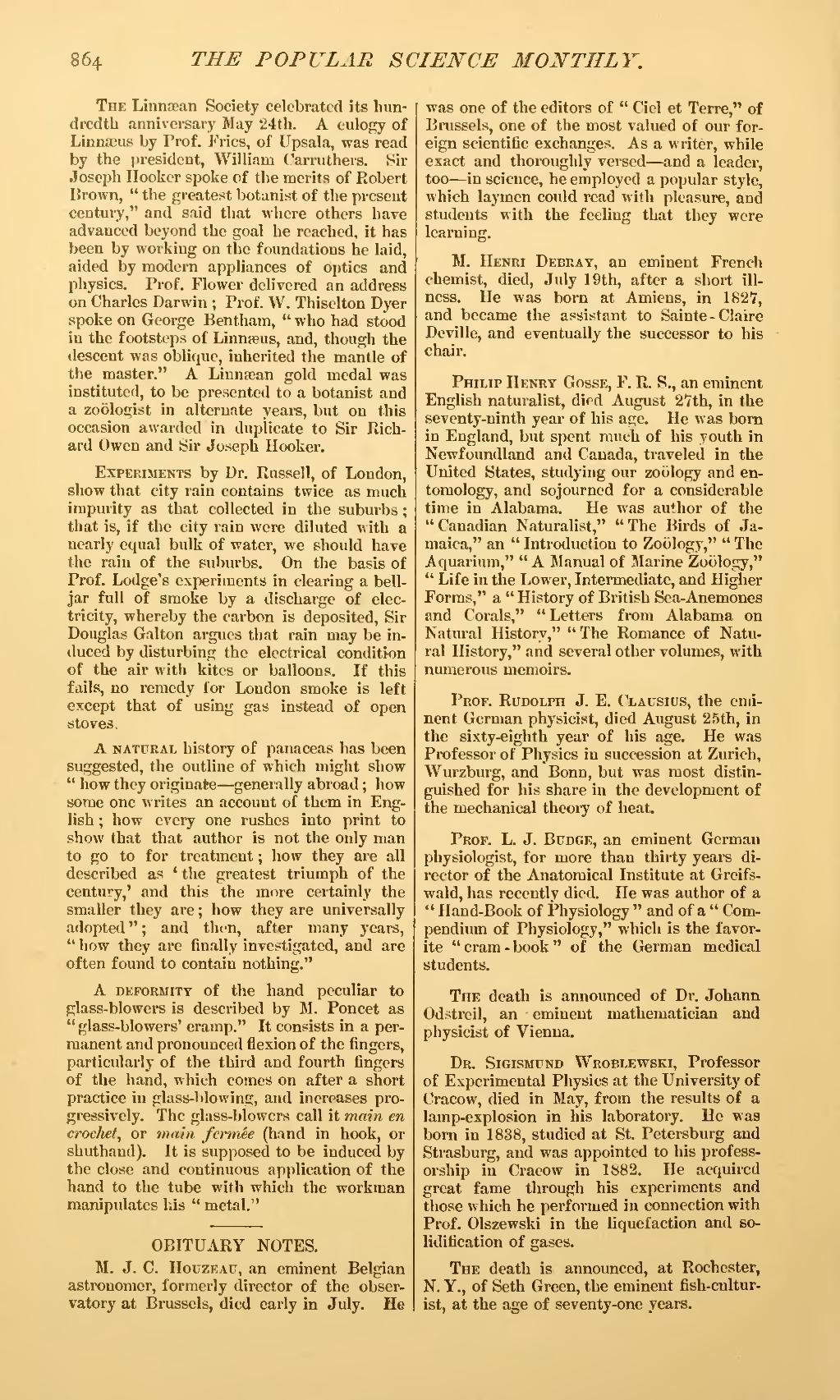The Linnæan Society celebrated its hundredth anniversary May 24th. A eulogy of Linnæus by Prof. Fries, of Upsala, was read by the president, William Carruthers. Sir Joseph Hooker spoke of the merits of Robert Brown, "the greatest botanist of the present century," and said that where others have advanced beyond the goal he reached, it has been by working on the foundations he laid, aided by modern appliances of optics and physics. Prof. Flower delivered an address on Charles Darwin; Prof. W. Thiselton Dyer spoke on George Bentham, "who had stood in the footsteps of Linnæus, and, though the descent was oblique, inherited the mantle of the master." A Linnæan gold medal was instituted, to be presented to a botanist and a zoologist in alternate years, but on this occasion awarded in duplicate to Sir Richard Owen and Sir Joseph Hooker.
Experiments by Dr. Russell, of London, show that city rain contains twice as much impurity as that collected in the suburbs; that is, if the city rain were diluted with a nearly equal bulk of water, we should have the rain of the suburbs. On the basis of Prof. Lodge's experiments in clearing a bell jar full of smoke by a discharge of electricity, whereby the carbon is deposited. Sir Douglas Galton argues that rain may be induced by disturbing the electrical condition of the air with kites or balloons. If this fails, no remedy for London smoke is left except that of using gas instead of open stoves,
A natural history of panaceas has been suggested, the outline of which might show "how they originate—generally abroad; how some one writes an account of them in English; how every one rushes into print to show that that author is not the only man to go to for treatment; how they are all described as 'the greatest triumph of the century,' and this the more certainly the smaller they are; how they are universally adopted"; and then, after many years, "how they arc finally investigated, and are often found to contain nothing."
A deformity of the hand peculiar to glass-blowers is described by M. Poncet as "glass-blowers' cramp." It consists in a permanent and pronounced flexion of the fingers, particularly of the third and fourth fingers of the hand, which comes on after a short practice in glass-blowing, and increases progressively. The glass-blowers call it main en crochet, or main fermée (hand in hook, or shuthand). It is supposed to be induced by the close and continuous application of the hand to the tube with which the workman manipulates his "metal."
M. J. C. Houzeau, an eminent Belgian astronomer, formerly director of the observatory at Brussels, died early in July. He was one of the editors of "Ciel et Terre," of Brussels, one of the most valued of our foreign scientific exchanges. As a writer, while exact and thoroughly versed—and a leader, too—in science, he employed a popular style, which laymen could read with pleasure, and students with the feeling that they were learning.
M. Henri Debrat, an eminent French chemist, died, July 19th, after a short illness. He was born at Amiens, in 1827, and became the assistant to Sainte-Claire Deville, and eventually the successor to his chair.
Philip Henry Gosse, F. R. S., an eminent English naturalist, died August 27th, in the seventy-ninth year of his age. He was born in England, but spent much of his youth in Newfoundland and Canada, traveled in the United States, studying our zoology and entomology, and sojourned for a considerable time in Alabama. He was author of the "Canadian Naturalist," "The Birds of Jamaica," an "Introduction to Zoölogy," "The Aquarium," "A Manual of Marine Zoölogy," "Life in the Lower, Intermediate, and Higher Forms," a "History of British Sea-Anemones and Corals," "Letters from Alabama on Natural History," "The Romance of Natural History," and several other volumes, with numerous memoirs.
Prof. Rudolph J. E. Clausius, the eminent German physicist, died August 25th, in the sixty-eighth year of his age. He was Professor of Physics in succession at Zurich, Wurzburg, and Bonn, but was most distinguished for his share in the development of the mechanical theory of heat.
Prof. L. J. Budge, an eminent German physiologist, for more than thirty years director of the Anatomical Institute at Greifswald, has recently died. He was author of a "Hand-Book of Physiology" and of a "Compendium of Physiology," which is the favorite "cram-book" of the German medical students.
The death is announced of Dr. Johann Odstreil, an eminent mathematician and physicist of Vienna.
Dr. Sigismund Wroblewski, Professor of Experimental Physics at the University of Cracow, died in May, from the results of a lamp-explosion in his laboratory. He was born in 1838, studied at St. Petersburg and Strasburg, and was appointed to his professorship in Cracow in 1882. He acquired great fame through his experiments and those which he performed in connection with Prof. Olszewski in the liquefaction and solidification of gases.
The death is announced, at Rochester, N. Y., of Seth Green, the eminent fish-culturist, at the age of seventy-one years.
